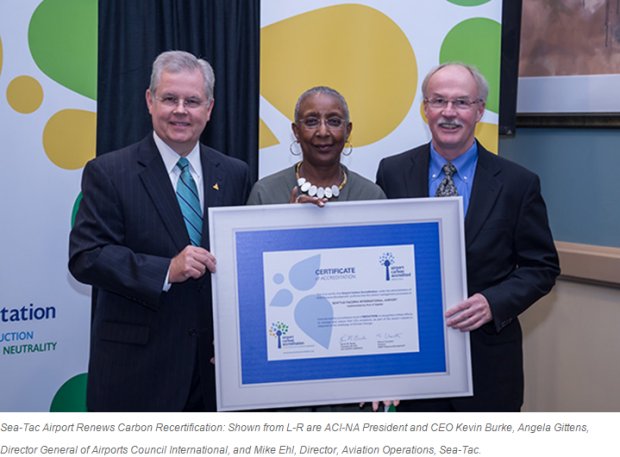Sea-Tac Airport Successfully Renews Carbon Recertification through Independent World-Wide Program

Sea-Tac was the first North American airport to attain carbon certification in 2014
For the second year in a row, Seattle-Tacoma International Airport has been certified as one of the world’s top airports in managing and reducing CO2 emissions by the Airport Council International’s (ACI) Airport Carbon Accreditation (ACA) program. Last year, Sea-Tac was the first airport in North America to achieve the accreditation and is joined by nine other airports this year.
Carbon accreditation is certified through an internationally recognized independent monitoring program and Sea-Tac was one of ten North American airports honored in a ceremony yesterday at the 2015 ACI-NA (North America) Annual Conference. Sea-Tac was again presented with Level 2 Carbon Certification and is the first North American airport to successfully renew its annual accreditation.
“As one of the country’s fastest growing airports, this accreditation is further recognition that a world class airport like Sea-Tac can successfully balance its growth in a smart manner by implementing sustainable environmental and conservation programs,” said Port of Seattle Commission Co-President Stephanie Bowman.
“As North American airport participation in the Airport Carbon Accreditation program grows, ACI-NA applauds the significant steps airports are taking to be leaders in environmental stewardship,” said ACI-NA President and CEO Kevin M. Burke. “I applaud these early adopters who have committed to lowering their carbon footprints and becoming better partners in the global aviation system. By achieving the ambitious goals of Airport Carbon Accreditation, these airports are setting our industry on a path toward continued success in innovation and sustainability.”
As part of Airport Carbon Accreditation, airports commit to reducing their emissions by making investments in heating and lighting efficiency technology, electric, hybrid or gas-powered vehicles, public transport incentive schemes, less corporate travel, and stakeholder engagement to encourage further emissions reductions.
In total, there are 4 different levels of ACA certification. Level 1 is carbon mapping; Level 2 is demonstrated carbon reductions; Level 3 is demonstrated reductions plus “optimization” with partners; and Level 3+ is carbon neutrality.
The following new, and/or existing environmental programs introduced at Sea-Tac, are anticipated to propel Sea-Tac to a Level 3 certification in the future:
- Electric Ground Service Equipment (eGSE) – providing nearly 600 electric charging stations to convert service equipment from diesel to electric, such as baggage tugs, ramps and pushback vehicles, with projected annual savings of $2.8 million in fuel costs and 10,000 tons of greenhouse gas emissions;
- Centralized Pre-Conditioned Air for aircraft parked at gates will save $15 million in airline fuel costs and 40,000 metric tons of greenhouse gases (began operation in July 2013),
- 48 Electric Vehicle Charging stations in the airport garage is the most of any airport in North America (added 2010 through late 2013)
- A fleet of clean, compressed natural gas (CNG) buses moves customers between the terminal and the Rental Car Facility saving 165,000 vehicle trips per month versus single rental car shuttles (opened 2012),
- Requirements for taxis serving the airport to use CNG vehicles or have high efficiency engines of 45 miles per gallon or better (2011),
- A centralized off-aircraft recycling system of large capacity, computer-monitored compactors that reduces waste sent to landfills, decreases air emissions, improves ramp safety, saves more than $250,000 each year and reduces pickup trips by 75% (2010).
ACA has been formally recognized by a number of key international organizations including: The European Civil Aviation Conference (ECAC) and EUROCONTROL, the International Civil Aviation Organization (ICAO), and the United Nations Environment Programme (UNEP).


